'Don't see young players coming through in men's team'
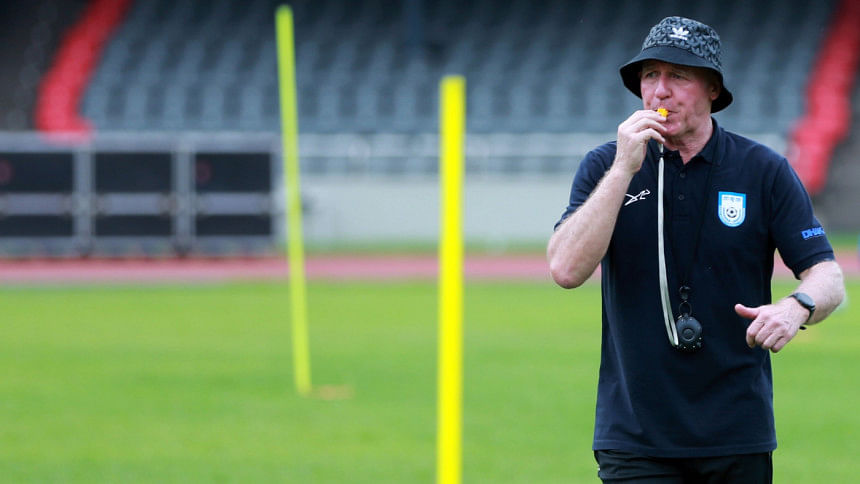
Peter Butler, the successful coach of Bangladesh women's football team, bared all in a freewheeling interview with The Daily Star's Atique Anam. The former West Ham United midfielder spoke about his football methodology, plans for the future, the shortcomings of the federation, men's football, and the controversies he has found himself in. Following is the second and final part of the two-part interview:
The Daily Star (DS): After the 7-0 win against Bahrain in the Asian Cup Qualifiers, you had said you hoped people would finally notice women's football and that it's been all about men's football in Bangladesh. Would you elaborate that statement?
Peter Butler (PB): Honestly, what I've done has been groundbreaking. It's never been done before in women's football -- coming in, ripping it apart, facing controversy. That narrative has run its course now. I was never deterred.
With the men's team, I don't see young players coming through. Even when I ran the academy for four months, there were none being selected. As a coach, you have to be brave -- to pick young players, give them minutes, build a platform.
My view has always been that you've got to get young players. You got to start it somewhere because you never know how good they are until you try and let them fly. It's like a bird. If you clutch its wings and don't let it flap its wings, it's never going to take off. A young player, if you don't give him opportunities, if you don't give him confidence, if you don't give him platform, you're really, really going to struggle.
I think (Javier) Cabrera should be coaching the Under-23s and Under-20s. If you want a successful senior national team, the head coach should oversee youth programmes. I did it in Liberia – it worked. Same in Botswana – we reached 86th in FIFA rankings. But it's not easy.
DS: In Botswana and Liberia, you drastically reduced the squad's average age. Was that your ultimate aim?
PB: When I took over Botswana in 2014, the squad's average age was 27–29. Some were 35. One player – Boitumelo Mafoko – was 35 (33 in fact). He was a legend, super fit, lean. I ripped the squad apart, brought in young players from the U-20s and U-23s, and kept a few experienced leaders like Mafoko. They led by example.
DS: So, it's not all about age?
PB: Absolutely not. Age is just a number. It's about ability and attitude, on and off the pitch. In Liberia too, a senior player told me, "Coach, if you need me as an impact sub, I'll do it. If you drop me, I respect it." That mentality is gold. The young players now excite me -- they are the future of this game.
DS: Talking about age and experience, you benched captain Sabina Khatun right after your very first match in 2024, against Chinese Taipei, and that caused quite a bit of backlash. What was the thinking behind this move?
PB: I couldn't play the system I wanted – the type of football I wanted – which was high intensity and high press. I couldn't include her in the team because she'd lost her legs. I'm very respectful of what she's done for the women's game in this country. I think she's been influential – to a level. But if she had been willing to be an impact player, I could have involved her. She wasn't. So, I had to make a decision.
And the same applies to Masura. My game is not based on a slow-paced style. It's based on a high-intensity, modern-day approach. I've got no axe to grind. But what they did – whatever it was – was completely wrong. Fundamentally wrong. And they tried to take me on – they took on the wrong person.

DS: So you're saying that the selection for the Asian Cup Qualifiers wasn't based on any sort of grudge?
PB: Oh no, never. I would never do that. The president asked me if I had a problem with bringing some of the girls back in. I said I'd take them into training, but they'd have to do fitness tests. I said I wanted Maria, I wanted Sheuli, I wanted Shamsunnahar, I wanted Monika, I wanted Ritu, and I wanted Rupna.
DS: But the other seniors didn't even get to give the fitness test.
PB: No, they didn't, because they'd already gone to Bhutan. But they weren't part of my plans.
DS: But before the Asian Cup qualifiers, you did say Sabina could still play a part – as an impact player or a mentor. And if Masura improved her fitness, there could be a chance.
PB: I think there was.
DS: Not anymore?
PB: No. You have to be realistic. Nabiran has really come to a level, and Kohati has come a long way. Sagorika, Tohura, Shamsunnahar, Trishna -- they're the new kids on the block. We have to acknowledge that.
DS: During the players' rebellion, there were allegations that you were very strict with the senior players and said things about them.
PB: Those were complete lies. No truth in any of it.
DS: But you did impose some restrictions -- like curfews and phone use?
PB: Yes. I wanted them in bed at a reasonable hour. Phones were collected—no TikTok and all that. I told them to stay off social media. I never banned it, just told them to be sensible. I never did anything drastic.
DS: Let's talk about you football methodology. You have experimented with formation throughout your tenure. In the Asian Cup Qualifiers, you used 3-4-3 and 3-5-2 formations. In SAFF U-20s, you went back to four defenders. Which one is your preferred system?
PB: The only time I played a 3-5-2 was against UAE. It didn't fully work – but there was a method behind it. I wanted to test their adaptability. My base formation is closer to a 4-1-4-1 or 4-3-3, depending on whether we're in possession or not. But I believe in exposing players to different systems. Systems don't make players; players make systems. I'm educating them to be flexible.
DS: How do you train your players for the high-line defence, knowing it can be a high-risk-high-reward approach?
PB: It takes a lot of work. We use positioning protocols -- like pressing triggers at 30 metres, the defensive "D," and the halfway line. It must be choreographed -- players must move in unison. You need forwards like Tohura, Shamsunnahar, Ritu, and Monika pressing aggressively. If the front doesn't press, the high line collapses. We drill this daily.
DS: But it can be counterproductive if defenders don't have the fitness that the system demands. In some matches in the qualifiers, especially towards the latter parts of the games, your defenders got easily outpaced by the opposition forwards.
PB: I disagree. I don't think we have a fitness issue at all. In fact, we often finish stronger than the other team. Sometimes games fall into what I call a "holding pattern," where both teams hesitate. That's not fatigue – it's tactical. If we were unfit, we wouldn't beat teams 7–0 or challenge teams ranked 50 spots above us.
DS: Afeida mentioned in an interview that Rupna's role as a sweeper-keeper has made the defenders' job much easier.
PB: Absolutely. It's all about interpretation. I want my teams to build from the back in a U-shape – centre-backs split, full-backs push high, and the deep-lying midfielder drops in to create a pseudo back three. Rupna has improved a lot. She's confident with the ball now and reads the game well.
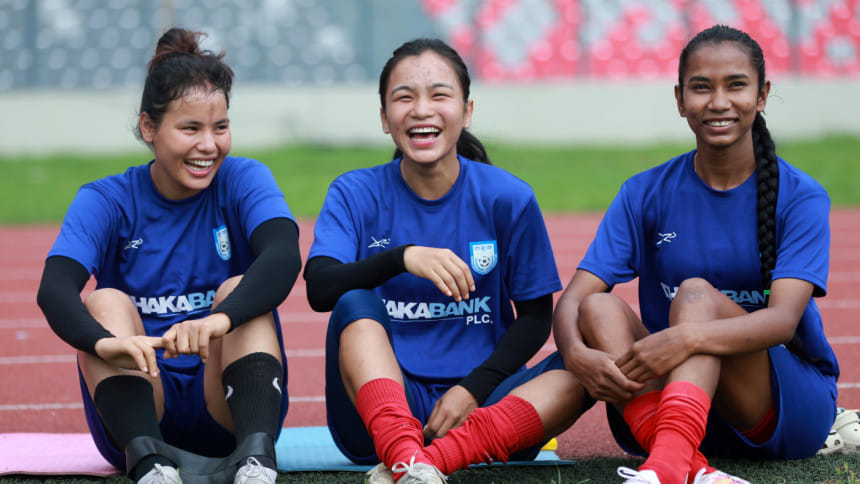
DS: Another footballer, Nabiran, used to play as a forward, now she's a centre-back and doing really well. How did this transition happen?
PB: We were training one day and Maria got injured. We were short-- Surma (Jannat) was just coming back from injury -- and I needed a centre-back. I just said, "Nabiran's not a striker, she's a central defender." Everyone looked at me like I was crazy. They said, "You know she used to play there," and I replied, "Yeah, but not very well." I said, "I'm going to turn her into one because she's the perfect high-line defender we have, along with Kohati."
DS: You've also redefined roles in midfield. Monika as a No. 10, for example.
PB: Yes. I play Monika as a No. 10. Maria is more aggressive and industrious. Sapna (Rani) is a great passer – maybe the best in the team – but needs to improve off the ball. Monika and Sapna are both very attack-minded, while Maria gives us that work rate. Each one brings something unique. Ultimately, my aim is to build a squad that's tactically smart, athletically prepared, and mentally tough. We're getting there.

 For all latest news, follow The Daily Star's Google News channel.
For all latest news, follow The Daily Star's Google News channel. 


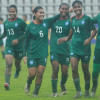

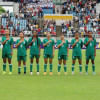
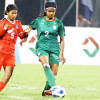



Comments